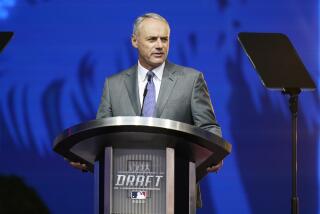Anti-doping agency boss blasts baseball
- Share via
As Commissioner Bud Selig made it abundantly clear that he has no intention of letting an independent agency run baseball’s drug-testing program, the president of the World Anti-Doping Agency criticized Selig and players’ union chief Donald Fehr on Wednesday for “essentially thumbing their nose at those who care about the integrity of the game.”
WADA President John Fahey charged Selig and Fehr with “blatant disregard for the truth” during their testimony before Congress on Tuesday, labeling their claims about the uncertain state of testing for human growth hormone and the independence of baseball’s testing program as “MLB fiction.”
WADA long has urged baseball to outsource testing to an independent third party, such as the U.S. Anti-Doping Agency. Selig said the owners and players already have hired an independent program administrator and can refine his role by granting him greater autonomy and security.
“WADA does not have a monopoly on independence in the world of drug testing,” Selig said in a statement.
In his report on baseball’s steroid era, former Sen. George Mitchell said HGH had replaced steroids as the performance-enhancing drug of choice because baseball does not test for HGH. Selig and Fehr testified that no HGH test is scientifically verified and commercially available, and expressed skepticism about the feasibility of storing blood samples for future testing.
Fahey said a “scientifically valid and effective test” exists for HGH and has been used in the Olympics but is not yet widely available. Gary Wadler, a WADA advisor, said the test could be widely distributed within months.
Still, said Dr. Gary Green, a UCLA professor and MLB advisor, “it’s not like I can go to the lab and order it tomorrow.”
Baseball gives players “a free pass to HGH abuse” by not taking blood samples even in the absence of a test, Fahey said. He said HGH remains stable in frozen blood, which would enable teams to take samples now and test later, for possible deterrence and retroactive penalties.
“I have not seen data to say this is feasible,” Green said. “It’s not as black and white as they paint it out to be.”
Mitchell testified Tuesday that either management or the union can fire the independent program administrator, at will and without cause.
“I do not believe he qualifies as independent,” Mitchell said.
In his report, Mitchell said management and the union should agree on how to implement a truly independent program. Selig suggested that goal could be achieved by ensuring the administrator can serve a fixed term and cannot be fired without good reason, but Fahey said an outside agency must run the program to guarantee accountability.
“Accountability would ensure that no loopholes would exist to be exploited by management and players,” Fahey said, “such as the current system used to get around the amphetamines ban by making attention deficit disorder claims in order to have access to stimulants like Ritalin.”
The number of players granted medical exemptions for drugs for ADD and hyperactivity disorders jumped from 28 in 2006 to 103 last year, according to figures submitted to Congress. Selig said a team physician and the program administrator must approve each exemption.
In his statement, Fahey said WADA has repeatedly offered to work with MLB. That invitation doesn’t figure to be accepted any time soon, given the response of Rob Manfred, MLB executive vice president for labor relations.
“These continuing, unprovoked, inaccurate publicity stunts by WADA have created an unwillingness to become more involved with WADA and its affiliates,” Manfred said.
--
More to Read
Go beyond the scoreboard
Get the latest on L.A.'s teams in the daily Sports Report newsletter.
You may occasionally receive promotional content from the Los Angeles Times.










